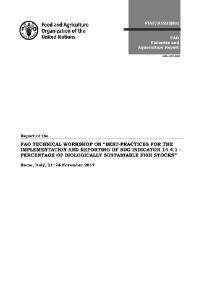Focal point
Location
The Food and Agriculture Organization of the United Nations leads international efforts to defeat hunger. Serving both developed and developing countries, FAO acts as a neutral forum where all nations meet as equals to negotiate agreements and debate policy. FAO is also a source of knowledge and information. We help developing countries and countries in transition modernize and improve agriculture, forestry and fisheries practices and ensure good nutrition for all. Since our founding in 1945, we have focused special attention on developing rural areas, home to 70 percent of the world's poor and hungry people.
Members:
Resources
Displaying 531 - 535 of 5073Cuba y la FAO
Cuba es miembro fundador de la FAO. La asistencia técnica en el país se ha centrado en potenciar la investigación,
organización y desarrollo de los sectores pesquero y forestal, en el manejo sostenible de tierras y aguas, la sanidad vegetal yanimal y la creación de capacidades en materia de nutrición. También la FAO ha apoyado las prioridades de Cuba medianteproyectos de cooperación dirigidos a alcanzar resiliencia frente al cambio climático, impulsar la intensificación sostenible deThe gender gap in land rights
For rural women and men, land is often the most important household asset for supporting agricultural production and providing food security and nutrition. Evidence shows that secure land tenure is strongly associated with higher levels of investment and productivity in agriculture – and therefore with higher incomes and greater economic wellbeing. Secure land rights for women are often correlated with better outcomes for them and their families, including greater bargaining power at household and community levels, better child nutrition and lower levels of gender-based violence.
Report of the Technical Workshop on “Best-practices for the implementation and reporting of SDG Indicator 14.4.1 – Percentage of biologically sustainable fish stocks, Rome, Italy, 21–24 November 2017
The FAO Technical Workshop on “Best-practices for the implementation and reporting of SDG indicator 14.4.1 – Percentage of biologically sustainable fish stocks” was held in Rome, Italy, from 21 to 24 November 2017. The purpose of the Workshop was to raise awareness of SDG 14.4.1’s significance and global reporting process, provide technical training to national practitioners on the analytical methods to produce Indicator 14.4.1, and look for examples of datasets and indicators from which best practices can be compiled.
Exploiter le potentiel d'adaptation du carbone organique des sols au changement climatique - Document final
Le colloque international sur le carbone organique des sols (GSOC17) a été conjointement organisé par:
• L’Organisation des Nations Unies pour l’alimentation et l’agriculture (FAO);• Le Partenariat mondial sur les sols (GSP) et son Groupe technique intergouvernemental sur les sols(ITPS);• Le Groupe international d’experts sur l’évolution du climat (GIEC);• L’interface science-politique (SPI) de la Convention des Nations Unies sur la lutte contre la désertification(CNULCD) et;• L’Organisation météorologique mondiale (OMM).Информационная записка
This information note describes the conference arrangements and provides essential logistical and practical information for delegates.











